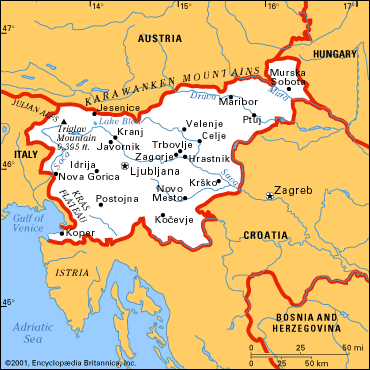
A: General
Official Name: Republic of Slovenia (Republika Slovenija)
Location: Slovenia shares borders with Hungary to the East, Italy to the West, Croatia to the South and Austria to the North
Capital: Ljubljana
Major Cities: Maribor, Kranj, Ptuj, Celje
Area: 20,273 sq. kms. (Approximately the size of Mizoram)
Climate: Mediterranean on coast and continental inland.
Minimum Temperature ranges -2.5 in January to 15.5 in July
Maximum Temperature ranges 3.4 in January to 27.3 in July
Population: Approximately over two million (2,111,461 as on October 2020)
Ethnicity: Slovenes 83.06%, Croats 1.81%, Serbs 1.98%, Bosnians1.10%, Hungarians 0.32%, Albanians 0.31%, Macedonians 0.20%, Roma 0.17%, Montenegrins 0.14%, Italians 0.11% (2002 census)
Religion: Roman Catholic 57.8%, Islam 2.4%, Atheist 10.2%, Orthodox 2.3%, Protestants 0.8% and others/unknown 26.5% (2002 census)
Language: Slovene
Time Zone: Central European Time Zone
(IST – 3 ½ hours during March-October and IST – 4 ½ hours during remaining period of the year).
ISD Code: + 386
B: Political structure
Slovenia is bicameral parliamentary democracy. National Assembly has 90 deputies elected for a term of four years. The last elections for the National Assembly were held in April 2022. Its current President (Speaker) is Ms. Urška Klakočar Zupančič. The National Council has 40 elected representatives with a five-year term. Its present Chairman is Mr. Alojz Kovšca.
President (Head of the State): The President of Slovenia is elected for five years for a maximum of two terms. The current President Mr. Borut Pahor was elected for a second term on 12 November 2017.
Government:
| Prime Minister |
Dr. Robert Golob |
| Deputy Prime Minister and the Foreign Minister |
Ms. Tanja Fajon
|
|
Deputy Prime Minister and the Minister of Labour, Family, Social Affairs and Equal Opportunities
|
Mr. Luka Mesec
|
|
Deputy Prime Minister and the Minister of Health
|
Dr. Danijel Bešič Loredan
|
| Interior Minister |
Ms. Tatjana Bobnar |
| Finance Minister |
Mr.Klemen Boštjančič |
Membership: Slovenia is a member of UN, OSCE, Council of Europe, IMF, WTO, NATO, OECD and EU. It joined the European Union in May 2004. Slovenia joined Schengen group of countries in December 2007.
C: Economic Indicators (All figures in Euro)
Currency: Euro (since January 2007)
GDP Growth Rate: 2.2% (2015), 3.1% (2016), 4.8% (2017), 4.1% (2018), 2.4% (2019), -5.5% (2020)
GDP (current prices): 38.86 bn (2015), 40.37 bn (2016), 43.00 bn (2017), 45.75 bn (2018), 48.01 bn (2019), 46.30 bn (2020)
GDP per capita: 18,830 (2015), 19,551 (2016), 20,809 (2017), 22,083 (2018), 22,983 (2019), 22,014 (2020)
Inflation: -0.5% (2015), -0.1% (2016), 1.4% (2017), 1.7% (2018), 1.8% (2019), -1.0% (2020)
Unemployment: 12.30% (2015), 10.8% (2016), 9% (2017), 4.8% (2018), 4.0 (2019), 5.1% (2020)
Global Exports: 23.94 bn (2015), 24.97 bn (2016), 28.22 (2017), 30.86 (2018), 33.47 bn (2019), 32.88bn (2020)
Global Imports: 23.30 bn (2015), 24.11 bn (2016), 27.60 (2017), 30.70 (2018), 34.04 bn (2019), 32.03 (2020)
Principal exports: Motor cars parts & accessories, electric machinery and equipment, machinery and mechanical appliances, pharmaceuticals, plastics and articles thereof, mineral fuels, iron and steel and aluminium, turbines, home appliances, organic chemicals, wood and articles thereof.
(Major destination of exports: Germany, Italy, Croatia, Austria, France, Switzerland, France, Poland, Serbia, Hungary, Russia, Czech Republic)
Principal imports: Motor vehicles parts and accessories, electric machinery and mechanical appliances, petroleum oils, electric machinery, pharmaceuticals, plastics, iron, steel and aluminium and articles thereof, organic chemicals
(Major sources of imports: Germany, Italy, Austria, Switzerland Croatia, Hungary, France, Netherlands, China, Poland, and Czech Republic)


